Ministry of National Health Services, Regulation and Coordination
 | |
| Agency overview | |
|---|---|
| Formed | 1 June 2011 |
| Headquarters | Islamabad |
| Minister responsible |
|
| Agency executive |
|
| Website | http://www.nhsrc.gov.pk/ |
The Ministry of National Health Services, Regulation and Coordination (Urdu: وزارت صحت, abbreviated as MoNHSRC) is a cabinet level ministry of the Government of Pakistan with responsibility for national public health.[1]
Organization
Healthcare was transferred to the provincial health departments after Eighteenth Amendment to the Constitution of Pakistan in June 2011.[2] In May 2013 however the federal ministry was reinstated by Prime Minister Mir Hazar Khan Khoso, as the Ministry of National Health Services, Regulation and Coordination. The function of this new ministry was to provide provision of medical services, frame health policies and enforce the same at a national level.
Provincial departments
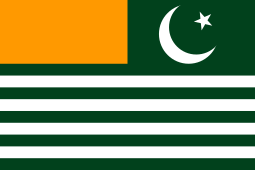
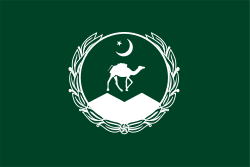

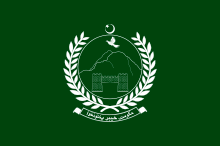
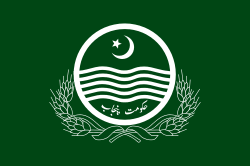
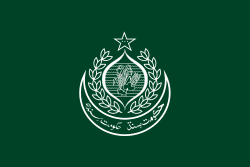
Divisions
Drug Regulatory Authority of Pakistan
The Drug Regulatory Authority of Pakistan was established in 2012 and is the largest department in the Ministry of National Health Services, Regulation and Coordination, with its headquarters in Islamabad and regional offices in the provincial capitals of Karachi, Lahore, Peshawar and Quetta. Several divisions are present in the department which include:
- Biological Evaluation and Research
- Controlled Drugs
- Drug Licensing
- Health and OTC Products (non-drugs)
- Medical Devices and Medicated Cosmetics
- Pharmacy Services
- Pharmaceutical Evaluations & Registration
- Quality Assurance and Laboratory Testing
Tobacco Control Cell
A separate cell was created in 2007. The rationale for the creation of the Cell stemmed from Pakistan’s international obligation. Pakistan is a signatory to WHO Framework Convention on Tobacco Control.[3] The aim of Tobacco Control Cell is to enhance tobacco control efforts in Pakistan.
National Institute of Population Studies
National Institute of Population Studies (NIPS) is the research organization established by the government since 1986. The NIPS has been mandated to act as a technical arm of the Government for undertaking high quality research and to produce evidence-based data, information for utilization by the Public sector and others agencies for policy formulation, strategic planning and making reference in the spheres of demography, population & development and health.[4]
Directorate of Malaria Control
Directorate of Malaria Control is a separate cell in ministry to co-ordinate country-wide efforts for implementation of Roll Back Malaria initiative for 50% reduction in the malaria burden in Pakistan by the year 2010. By the year 2015 >70% of the high risk population of Pakistan having access and using effective malaria prevention and treatment.[5]
Programs
The ministry directly runs several federal health programs nationwide:
National AIDS Control Program
National AIDS Control Program (NACP) was established in 1986-87. In its early stages, the program focused on laboratory diagnosis of suspected HIV cases.[6]
National Tuberculosis Control Program
Having treated 700,000 tuberculosis patients so far, free diagnosis and treatment, and public awareness regarding the disease are the main components of this program. It is currently headed by Lt. Aazam Parvez, Pakistan Army Medical Corps.[7]
Devolved programs
The following programs were transferred to provincial health departments in 2011.[2]
- National Program for Family Planning & Primary Health Care (LHW) Program
LHW Program is the world's largest community based primary health care program delivering services through 96,000 LHWs in their own communities
- Expanded Program on Immunization (EPI)
EPI is aimed at immunizing children against Childhood Tuberculosis, Poliomyelitis, Diphtheria, Pertussis, Measles, Tetanus and also their mothers against Tetanus.
- National Maternal, Neonatal & Child Health (MNCH) Program
The aim of the MNCH program is to improve accessibility and quality of health services and fill the resource gaps without duplicating inputs or activities.
- National Program for Prevention and Control of Hepatitis
More than 400,000 people have been vaccinated through this program, while 104 hospitals have been equipped to provide free treatment to patients.
See also
External links
References
- ↑ "DFID Delegation called-on Mrs. Saira Afzal Tarar, Federal Minister for the Ministry of National Health Services, Regulation & Coordination | Press United to Serve Humanity". push.pk. Archived from the original on 2014-07-15. Retrieved 2014-07-22.
- 1 2 "Cabinet approves devolution of seven ministries - Pakistan - DAWN.COM". dawn.com. Retrieved 2014-07-22.
- ↑ "Tobacco Control Cell, NHSR&C Division, Government of Pakistan". tcc.gov.pk. Retrieved 2014-07-22.
- ↑ "nips". nips.org.pk. Retrieved 2014-07-22.
- ↑ "MALARIA CONTROL PROGRAM IN PAKISTAN". dmc.gov.pk. Retrieved 2014-07-22.
- ↑ "National AIDS Control Programme". nacp.gov.pk. Archived from the original on 2014-06-23. Retrieved 2014-07-22.
- ↑ "National TB Control Program - Pakistan". ntp.gov.pk. Retrieved 2014-07-22.